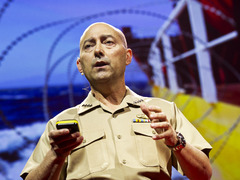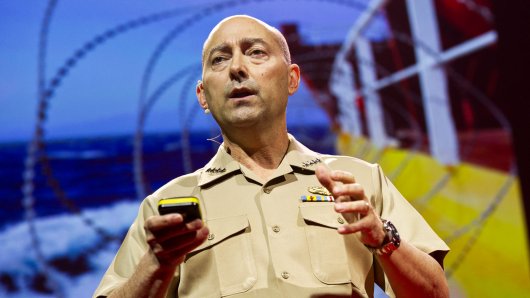“Walls don’t work,” James Stavridis declared at TEDGlobal 2012. A highly accomplished Navy Admiral, Stavridis recalls 20th-century phenomena like trench warfare and the Berlin Wall. “Instead of building walls for security, we need to build bridges.”
 James Stavridis: A Navy Admiral's thoughts on global security
In his brass-tacks talk, Stavridis lays down a vision of “open-source security,” which he defines as “connecting the international, the inter-agency, the private/public, and lashing it together with strategic communication.” The basic point: that to combat 21st-century threats like cybercrime, terrorism, trafficking and piracy, the military cannot work alone. Stavridis invokes the example of Wikipedia to make his point.
James Stavridis: A Navy Admiral's thoughts on global security
In his brass-tacks talk, Stavridis lays down a vision of “open-source security,” which he defines as “connecting the international, the inter-agency, the private/public, and lashing it together with strategic communication.” The basic point: that to combat 21st-century threats like cybercrime, terrorism, trafficking and piracy, the military cannot work alone. Stavridis invokes the example of Wikipedia to make his point.
“Wikipedia is not created by 12 brilliant people locked in a room writing articles. Wikipedia every day is tens of thousands of people inputting information,” Stavridis says. “It’s the perfect image for the fundamental point that no one of us is as smart as all of us thinking together.”
Stavridis’ thoughts on security are surprising. Below, listen to 8 other TEDTalks that challenge you to think of war, peace and military life in new ways.
[ted id=504]
PW Singer on military robots and the future of war
Does having robots and drones in the field change the parameters of war? Absolutely, says military analyst P.W. Singer in this powerful talk. Singer argues that robotic warfare lowers the bar for going to war, and points out that terrorists can easily harness the same technology. While Singer rung the warning bell on the perils of drone warfare back at TED2009, the topic is still being hotly debated, including in the piece “The Moral Hazard of Drones” on The New York Times’ Opinionator blog today.
Keith Nolan: Deaf in the military
Keith Nolan grew up fascinated by military history, but heard “no, no, no” every time he tried to enlist. Why? Because being deaf is an automatic disqualification. In this talk, given in sign language, Nolan recounts his long-term fight to fight for his country, making the case for why citizens with disabilities should be a part of the military.
[ted id=968]
Inge Missmahl brings peace to the minds of Afghanistan
In Afghanistan, a country of 30 million that has been through intense warfare and unrest, there are only two dozen psychiatrists. Jungian analyst Inge Missmahi explains her work in the country, helping to address their trauma and depression and promote national healing.
[ted id=1112]
Stanley McChrystal: Listen, learn … then lead
Four-star general Stanley McChrystal shares the thoughts running through his head during a parachute jump, from “Why didn’t I go into banking?” to “What does it mean to be a leader?” The former commander of U.S. and International forces in Afghanistan explains at TED2011 that, over his decades in the military, he’s come to realize that good leaders let you fail, without letting you be a failure.
[ted id=33]
Thomas Barnett: Rethinking America’s military strategy
In a classic talk from TED2005, military strategist Thomas Barnett makes the bold statement that to win a war, we need to win the peace. He advocates splitting the US military into a two-tiered power capable not only of winning battles, but of preserving international calm.
[ted id=270]
Paul Collier’s new rules for rebuilding a broken nation
Economist Paul Collier explains that 40% of countries recovering from war fall back into conflict within 10 years. He lays out a three-part plan for post-conflict aid, which doesn’t focus on the political quick fix.
[ted id=395]
Samantha Power on a complicated hero
Journalist Samantha Power looks at why we as a culture do not pay attention to genocide. She tells the gripping story of Sergio Vieira de Mello, a UN diplomat who traveled to the world’s most broken countries and navigated the “lesser-evil terrain” of negotiating with dictators to help their people survive.

Comments (2)
Pingback: A Shared Culture | Cheers to Creativity